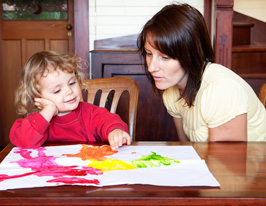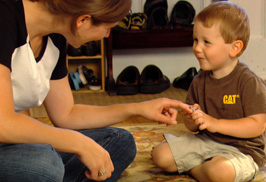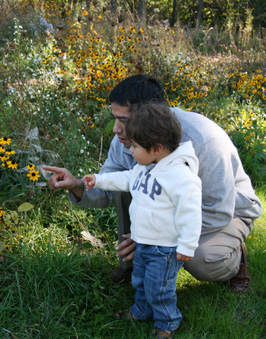Making Conversation

Prepare the environment to listen and respond
- Your child will be involved with more and more people in his life. Remember that all these new adults in your child's world make up his language environment just as much as you. Make sure that every one who is involved in his life is aware how important it is to use detailed expressive language all the time.
- Make sure everyone who he spends time with understands the value of responding to his efforts to say words and communicate at this time. He is trying hard and when this is acknowledged he will be encouraged to keep trying but if no one notices he may feel that his efforts are futile and he may stop trying.
Connect with your child's language explosion
- Name items related to all the rooms of the house: kitchen words, bathroom words, bedroom words, etc. Use correct vocabulary, not only general words but also particular words, like ‘garlic press’ and ‘shower curtain’.
- If your child says words like ‘pasgetti’, respond with the correct word without making it feel like you are constantly correcting him: ‘Yes, we are having spaghetti for dinner.’ Don’t repeat mispronunciations or make them the family joke. By repeating the phrase with the correct word or by continuing the communication, you help him gradually absorb the correct word and usage.
- When your child has about fifty words in his vocabulary, he will begin to string two- or three-word sentences together, usually with the correct syntax (word order), such as ‘more juice’. Respond with a complete sentence: ‘Yes, you may have more juice.’
- Don’t correct when he over-generalises, as in ‘I goed to bed’ or ‘I getted up.’ When he applies a rule of grammar like adding -ed to indicate the past tense, it is an indication that he understands how language works but has not quite grasped that there are exceptions. Keeping the conversation going is more valuable than saying, ‘Goed is wrong. We say I went.’
- Another example of over-generalization is his ability to categorise: All men are daddies and all four-legged animals are dogs. He is literally grouping objects in his brain by their labels. You can support this stage by providing concrete activities that group objects into categories. Sort the spoons from the forks, the big books from the small books, the shirts from the pants.
Make time to listen and respond
- Continue to listen intently and provide more and more vocabulary to support his emerging understanding. Your child is encouraged to talk and communicate when you make time to talk and listen to him.

